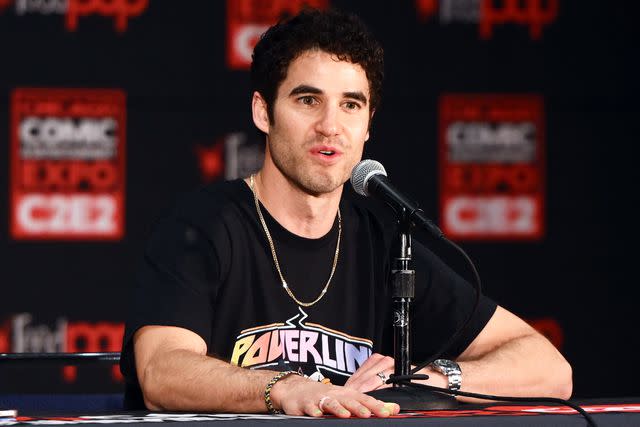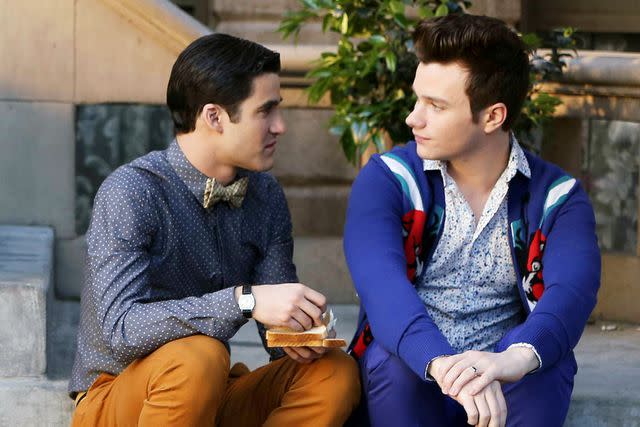“Glee” star Darren Criss says he is 'culturally queer' thanks to San Francisco upbringing
- Oops!Something went wrong.Please try again later.
- Oops!Something went wrong.Please try again later.
- Oops!Something went wrong.Please try again later.
"There was an awareness of the gay experience that was not a foreign concept to me," the actor said.
When Darren Criss broke out on Glee, he instantly became a "teenage dream" for viewers — especially for LGBTQ+ audiences, who were able to see themselves represented in a new way in television.
Criss himself identities as a straight, cisgender man, but he says that his upbringing in San Francisco, Calif., helped him understand the importance of his character, Blaine, and his character's relationship with Kurt (Chris Colfer).
When asked at the Chicago Comic & Entertainment Expo (C2E2), what it was like portraying the groundbreaking relationship on television, Criss replied, "It was f---ing awesome.... Nowadays, we just call it a relationship on TV. But to contextualize it, a gay relationship on mainstream Fox, that's a pretty cool thing to be a part of," he said, adding emphasis when naming the network.

Daniel Boczarski/Getty
Darren Criss"I have been so culturally queer my whole life," he continued while appearing on a panel over the weekend. "Not because I'm trying — you know, actually, I was gonna say not because I'm trying to be cool but I'm gonna erase that, because I am trying to be cool. The things in my life that I have tried to emulate, learn from and be inspired by are 100 percent queer as f---."
"It was in queer communities that I've found people that I idolize, that I want to learn something from," he said. "And I'd say that's a gross generalization, that's a lot of things and a lot of people. But I grew up in San Francisco in the '90s. I watched men die. There was an awareness of the gay experience that was not a foreign concept to me. So, it was a narrative that I cared deeply about."
Criss also clarified that he didn't feel any ownership or entitlement over the role, but instead, felt a sense of responsibility once he was cast. "[I wasn't] like, 'I'm the man for the job,'" he explained. "They hired me...They said, 'You're the guy,' and I said, 'Okay, I'm the guy, I will do my best. I will do my best to talk about it in the way I believe and a way that I'm passionate about.'"

Mike Yarish / Fox / Courtesy of Everett
Darren Criss and Chris Colfer on 'Glee'Criss portrayed Blaine Anderson for five of Glee's six seasons. He was introduced as an openly gay student at Dalton Academy and a member of a cappella group the Warblers in season 2. He recurred throughout the season. In season 3, Criss was upgraded to a series regular and Blaine transferred to William McKinley High School, home of Kurt and the New Directions. When the series ended, Blaine and Kurt were happily married after many ups and downs.
For Criss, Glee's legacy of portraying a relationship on television that so many people hadn't seen before was the most meaningful part of his experience. "In many ways, I'm glad it was me because it was a thing I really liked showing," he reflected. "It meant a great deal to me and it meant a great deal to other people. Because when people say they were affected by that show or that relationship, it's not because of me, it's because of that relationship on TV and the risks that people took to put that on TV."
"It took the people watching it to have the aptitude for seeing beyond what was maybe given to them in other avenues of culture. People of all ages, all spectrums of awareness say, 'I didn't grow up with a show like that and it was a really meaningful thing for me to see,' and I go I didn't grow up with a show like that and that would've been very meaningful for me too. Regardless of the fact that I'm a straight kid. That has value. For anyone who's been an underdog, we all know, in any shape or form — sexual, religious, biological — it has value because there's going to be a lot of people who see that and say, 'Okay, I can now understand this in a context that maybe I wasn't able to before.'
"It was a f-ing privilege," he concluded, "and I love talking about it and I'm so grateful I got to do it."
With additional reporting by Chris Cosgrove.
Sign up for Entertainment Weekly's free daily newsletter to get breaking TV news, exclusive first looks, recaps, reviews, interviews with your favorite stars, and more.
Related content:
Darren Criss pitched a Sondheim-themed episode of Glee — which was nothing like the one that aired
Darren Criss on how Steven Spielberg inspired his Hollywood character
Read the original article on Entertainment Weekly.

